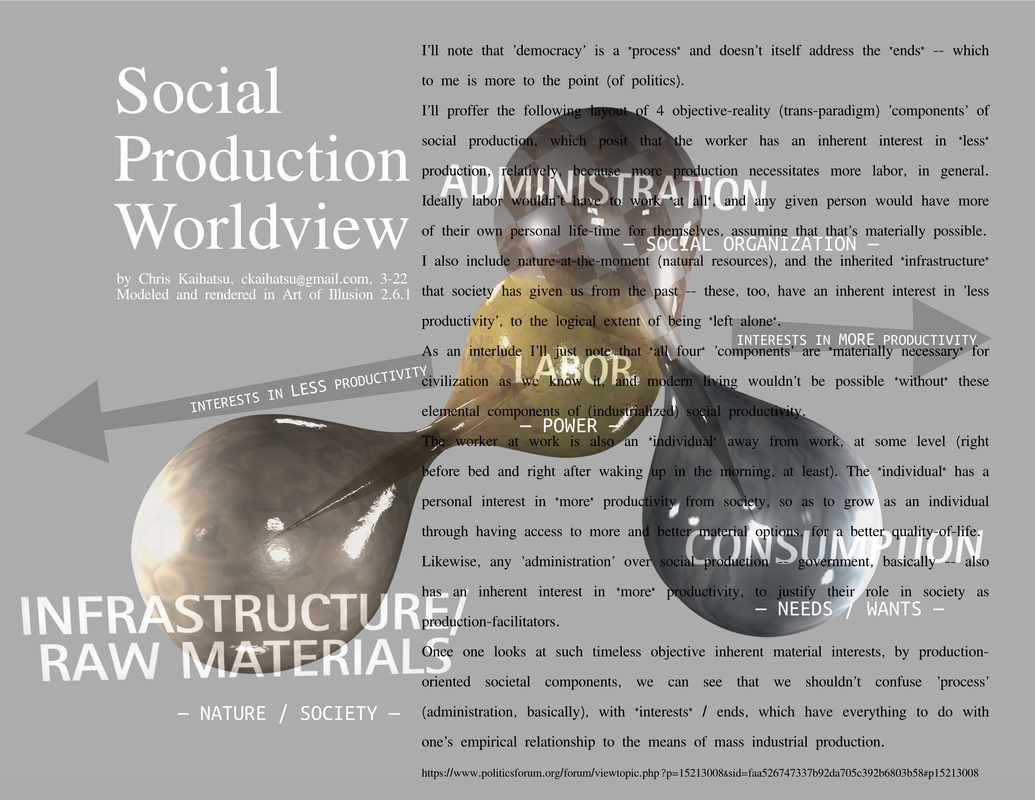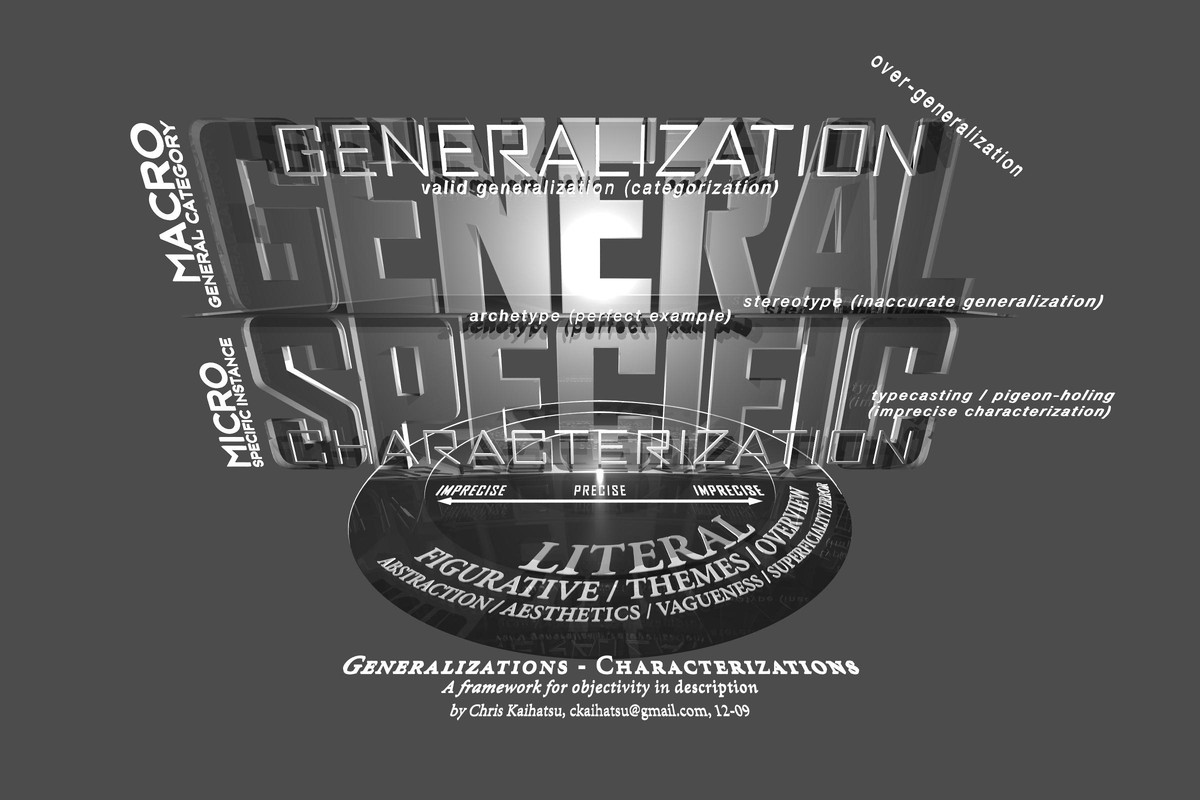Rugoz wrote:Abstract away:
"To eliminate, omit, or disregard the details of something in order to generalize or simplify it at a conceptual level."
It's quite hilarious to accuse marginalism of abstracting things away when that's exactly what it didn't do.
Instead it built a theory of price formation from the ground up, starting with a pure exchange economy, adding production and market structure.
All thoughts are abstractions in that one isolates things from the concrete whole of reality.
The issue is whether one abstracts what is essential or not. Marginalism is not criticized for making abstractions as much as the types of abstractions they make tend to natural capitalist production as a purely technical manner and bifurcating reality in such a way that sociology ends up a separate discipline in the attempt to conceive of asocial actors.
https://kapitalism101.wordpress.com/2014/07/21/abstraction-abstract-labor-and-ilyenkov/ The goal of this abstraction is to eventually identify the essential connections between different abstract aspects, slowly piecing the pieces together to give us a concrete picture of the whole. However this can only happen if we abstract correctly. There are two senses in with Marx talks of abstractions, a good and a bad way of abstracting. When abstraction has gone bad Marx often refers to the abstraction as ‘one-sided’. This means that the abstraction views an aspect of reality in an incomplete, one-sided way. An essential aspect of the nature of the object has been left out. Often Marx critiques bourgeois economists for making one-sided abstractions that make it seem like capitalism is a universal, a-historical system by abstracting away all of the historically specific aspects of capital. For instance, if we say that capital is just tools used to make more tools we have performed a sloppy, 1-sided abstraction. We are viewing capital merely from the abstract general features that capital has of increasing physical quantities of things while abstracting away the historically specific value-relations that give capitalism its essential nature.
This shows that abstraction can be arbitrary. If we are free to select one general feature over another we can radically change the concept of capital. If we choose only the ahistorical features we can make capital seem eternal. If abstraction is just seen as the identification of general features then we have no choice but to be arbitrary in our abstractions. But if abstraction is seen differently, as identifying the essential nature of an object, as identifying the “relation within which this thing is this thing” as Ilenkov puts it, then we can be scientific about our abstractions.
When we make an abstraction we want to select that aspect of the object which identifies its essence. Since the essence of things is in their relation to other things, we want to identify the essential relations which govern the object, abstracting away other non-essential aspects.
So you miss the point if you take the criticism to be about abstracting rather than the manner in which one abstracts being one sided.
It is important to be able to generalize the features which underpin simpler forms while ignoring that which is inessential.
Adam Smith and David Ricardo also consider a simple exchange economy in their abstractions to great effect. Marx even uses it as an analytical method to consider simple commodity exchange to focus on some things instead of everything.
https://kapitalism101.wordpress.com/2009/12/29/das-kapital-vol-3-part-2-chapter-10-equalisation-of-the-general-rate-of-profit-through-competition-market-prices-and-market-values-surplus-profit/ It is a point of debate to what extent Marx treats simple commodity production as an historical phenomenon or merely a theoretical abstraction or whether he treats it at all.
But to the narrowness of marginist abstractions, a heavy focus on consumption that production almost seems independent except to the extent consumption acts as feedback is a significant difference to the classical theorists that forecloses many questions and analyses.
There is the issue of how money is seen as but a more efficient means of barter but missing its qualitative difference and how it generalizes uncertainty in future exchanges but this was ignored for the most part with a theoretical assumption of god like consumers.
https://www.marxists.org/archive/vygotsky/works/crisis/psycri05.htm The existence of money demands that we immediately abandon the basic principles of marginal utility. In the simple barter models posed by marginalists both actors can fully judge the use-values of items they are trading. But when we are exchanging things for money we are not just trading two commodities in isolation. Money links each commodity to an entire of world of commodities. Now if it was possible to know the future values of all commodities then it would be possible to generalize the marginalist barter model into a theory of indirect exchange. But we don’t know the future values of things. These are entirely uncertain. In fact, If the values of all commodities were always known we wouldn’t need money because any commodity could serve as money. This compromises the entire marginalist model.
In other words, marginalism can only have a theory of indirect exchange (of commodities traded for money instead of commodities bartered with each other) is all parties have perfect information on prices. But if we make this assumption we can no longer explain competition (or money).
And the very view of individual consumers is nonsensical, it is so extreme in its antisocial character that on the face of it, it isn’t about humans and is also been a massive theoretical failing.
https://www.researchgate.net/publication/227361760_Still_Dead_After_All_These_Years_Interpreting_the_Failure_of_General_Equilibrium_TheoryABSTRACT
More than 25 years after the discovery that the equilibrium point of a general equilibrium model is not necessarily either unique or stable, there is still a need for an intuitively comprehensible explanation of the reasons for this discovery. Recent accounts identify two causes of the finding of instability: the inherent difficulties of aggregation, and the individualistic model of consumer behaviour. The mathematical dead end reached by general equilibrium analysis is not due to obscure or esoteric aspects of the model, but rather arises from intentional design features, present in neoclassical theory since its beginnings. Modification of economic theory to overcome these underlying problems will require a new model of consumer choice, nonlinear analyses of social interactions, and recognition of the central role of institutional and social constraints.
…
There are two separate points here: one involves the methodology ofaggregation, and the other concerns the behavioural model of the individual.
Both are basic causes of the instability of general equilibrium.Instability arises in part because aggregate demand is not as well behavedas individual demand. If the aggregate demand function looked like anindividual demand function ± that is, if the popular theoretical ®ction of a`representative individual’ could be used to represent marke t behaviour ± thenthere would be no problem.
Unfortunately , though, the aggregation problemis intrinsic and inescapable. There is no representative individual whosedemand function generates the instability found in the SMD theorem(Kirman 1992). Groups of people display patterns and structure s of beha-viour that are not present in the behaviour of the individual members; this is amathematical truth with obvious importance throughou t the social sciences.
For contemporary economics, this suggests that the pursuit of micro-foundations for macroeconomics is futile. Even if individual behaviour wereperfectly understood , it would be impossi bl e to draw useful conclusion s aboutmacroeconomics directly from that understanding, due to the aggregationproblem (Rizvi 1994, Martel 1996).
This fact is re¯ected in Arrow’s one-sentence summary of the SMD result, quoted at the beginning of this section.The microeconomic model of behaviour contributes to instability becauseit says too little about what individuals want or do. From a mathematica lstandpoint, as Saari suggests, there are too many dimensions of possiblevariation, too many degrees of freedom, to allow results at a useful level of speci®city. The consumer is free to roam over the vast expanse of availablecommodities, subject only to a budget constraint and the thinnest possibleconception of rationality: anythin g you can a ord is acceptable, so long asyou avoid blatant inconsistency in your preferences .
The assumed independence of individuals from each other, emphasized byKirman, is an important part but not the whole of the problem. A reasonabl emodel of social behaviour should recognize the manner in which individual sare interdependent; the standard economic theory of consumptio n fails toacknowledge any forms of interdependence, except throug h market transac-tions. However, merely amending the theory to allow more varied socialinteractions will not produce a simpler or more stable model. Indeed, ifindividuals are modelled as following or conforming to the behaviour ofothers, the interactions will create positive feedback loops in the model,increasing the opportunity for unstable responses to small ¯uctuations (seeSection 5).
Atomized individuals who only interact through the market is of course something sought to be actualized.
https://www.ethicalpolitics.org/ablunden/pdfs/flourishing.pdf When economists build their science on the utilitarian assumption of an independent, individual economic agent who makes rational decisions to maximise their own utility, they take it that the norms of utilitarianism are universally adhered to by the economic actors. In the event that the subjects of a community do not act as individuals maximising their own utility, then the science fails. Corrections such as including delayed or incomplete information do not change the underlying ethical problem. More importantly, governments and firms which make policy on the basis of economic science, and therefore utilitarian ethics, are acting so as to foster this ethos in the community, with all the consequences in terms of inequality and social disintegration.
Even with Keynes and other theorists they often assume the same perfectly idealized model in marginalism but introduce the real imperfections. A lot of heterodoxy is just this, partial reform and correction to what can be fundamental assumptions that are seen as untenable.
Now in every theorist you will see analytically ideal models like the simple exchange economy, but the idea is to use such models to illuminates facts about how the real world functions. But the idealizations and abstractions in marginalism seem to far from the essential qualities of the economy. It doesn’t have to include everything about humans but it shouldn’t be so distant from them.
And one that sticks out to me is that the focus on individuals entirely abstracts the structural relations of production which in part inform the consumption of different groups or out constraints on it.
https://kapitalism101.wordpress.com/2011/09/30/marginal-futility-reflections-on-simon-clarkes-marx-marginalism-and-modern-sociology/ In abstracting away the social relations of capitalism marginalism must assume that these abstract individuals enter exchange with given needs and given resources. Where do these needs and resources come from? The marginalist answer is that this question is outside the sphere of economics- that it doesn’t matter to economic theory where these needs and resources come from. But what if our economic system actually reproduced these needs and resources? If we could show that capitalism produced the hedonistic consumer as well as the conditions of scarcity the consumer confronts then we could expose a disastrous feedback loop at the core of marginalism. It seems that when we just assume given needs and resources we are actually only pretending to abstract away from capitalist social relations. While on the surface marginalists appear to be talking about a universal individual in universal conditions, in actuality they are sneaking all of the social relations of capitalism in the back door.
I like the way Clarke develop his proof this problem: Commodity exchange presupposes individuals with different needs and different resources because if everyone had the same stuff there would be no reason for exchange. Thus exchange presupposes differences. If exchange is systematic these differences must also be systematic. Thus the formal equality and freedom of exchange is founded on different resource endowments. This means that the content of exchange can’t be reduced to its form (free, juridically equal relations between people) but must be found outside of exchange in the realm of production and property.
…
Different types of exchange presuppose different production and property relations. The simple commodity exchange (independent producers exchanging the product of their labor in the market) is a popular image in marginalist accounts of exchange (as well as market-anarchism fantasies) yet such a system of exchange has only existed within larger societies dominated by other social relations (ie feudalism, capitalism, state-capitalism/20th century communism). Capitalist exchange presupposes social relations between two social classes, one owning the means of production, the other nothing. As we’ve seen, Marginalism tries to treat all factors of production with the same theoretical tools of subjective preference theory. But the division of the social product into rent, profit and wages actually presupposes antagonistic social relations between classes and thus requires different theoretical ideas.
Marginalists would like to treat the unequal resource endowments of individuals as due to extra-economic factors, consigning these concerns to the fields of history and sociology. But these inequalities don’t just proceed exchange historically. They are actually reproduced by exchange. Capitalism generates a world in which individuals must maintain a certain standard of living in order to survive (try paying the bills without a phone, house, car, work clothes, haircuts, health-care, etc.) and must engage in wage-labor. And wage-labor actively reproduced the two social classes of capitalist and worker and their violently divergent relationships to the means of production. Without scarcity we couldn’t have wage labor. There would be no reason to work. Thus capitalism must constantly reproduce scarcity.
Maybe I’m just ignorant and not that immersed to see the nuances, but a lot about marginalism seems inadequate and it becomes easier to see its dominance as having an ideological function than its superiority in explaining economic relations. It simply side steps a lot of issues and becomes part of the basis to promote a particular view of the economy that is extremely narrow and only comes about in a question on the role of state interference in the market.
https://www.ethicalpolitics.org/ablunden/pdfs/For%20Ethical%20Politics.pdf#page90
-For Ethical Politics















 - By JohnRawls
- By JohnRawls